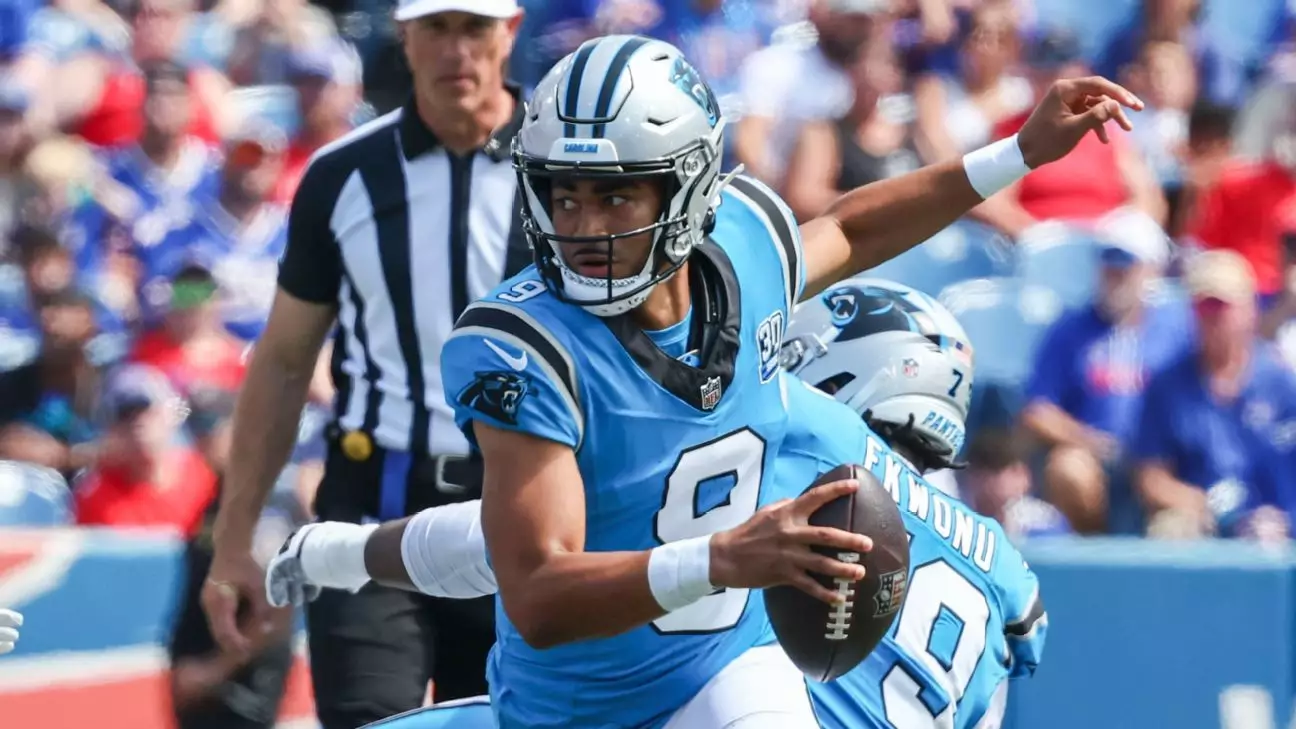The Carolina Panthers are currently at a crossroads with their young quarterback, Bryce Young. After a challenging start to the season, where the team finds itself at 0-2 and Young’s individual performance raises eyebrows, coach Dave Canales has come out firmly in defense of their number one draft pick from 2023. The discourse surrounding Young has shifted dramatically, with conversations now encompassing not just his potential as a franchise quarterback but also the implications of his recent benching.
From the outset, Coach Canales has made clear his belief in Young’s abilities, asserting, “Absolutely,” when asked if Young remains a viable option for the franchise quarterback role. This emphatic endorsement comes despite Young’s difficulties on the field, including a troubling two-game performance characterized by three interceptions and no touchdowns. Nevertheless, Canales has demystified any rumors of the organization moving on from Young, stating, “That’s not something we’re really considering.” This suggests a desire for patience and continuity within the franchise, emphasizing not only the importance of Young but also the significance of having experienced players—like Andy Dalton—who can provide guidance and maintain team stability during rocky times.
The support for Young extends beyond coaching staff. Players like running back Miles Sanders and veteran wide receiver Adam Thielen have publicly rallied behind their young quarterback. Sanders emphasized that the season is far from over and praised Young’s work ethic and determination, noting he’s “smart” and “the first one in the building, the last one out.” Similarly, Thielen reiterated his faith in Young’s potential, highlighting recent practice sessions where Young demonstrated his impressive skills. This camaraderie is significant; it serves not only to boost Young’s morale during this difficult time but also solidifies the locker room dynamic, which can be fragile amidst a losing streak.
A notable point of contention has emerged regarding Young’s physical stature, which has been scrutinized throughout his career, particularly due to his listed height of 5-foot-10. There is a contingent that believes this has contributed to his struggles, but both Thielen and Canales dismissed this narrative as overstated. Thielen argued that the size debate distracts from more pertinent factors influencing performance, suggesting that in today’s game, the adaptability and skill set of a quarterback matter far more than height. By addressing this issue, Canales and the players aim to redirect the conversation toward Young’s potential and capabilities rather than succumbing to the sensationalism surrounding his physique.
Canales openly acknowledges that the team’s mentality is rooted in development, a critical element that shapes how they view Young’s role and future. His suggestion that “the development didn’t stop” implies a long-term investment in Young’s evolution as a quarterback. The coaching staff’s decision to bench him does not seem intended as a punitive measure but rather as an opportunity to allow Young to reassess, regroup, and refine his approach. This developmental strategy underscores a belief that future success can be cultivated with time and persistence, even if that involves facing immediate challenges.
However, the act of benching a first-round pick—especially one who won the Heisman Trophy in college—can inevitably raise questions about confidence and mental resilience. Canales was careful not to speculate on how the benching would affect Young’s psyche, instead focusing on the collective performance of the team. This response reflects the broader challenges of managing a high-profile rookie, where expectations often clash with reality. Although Young is anticipated to address the media, insiders suggest that he may be uneasy about the abrupt shifts in his playing status. This situation underscores not only the complexities inherent in professional sports but also the importance of psychological support systems for young athletes.
As the Carolina Panthers look ahead, the narrative surrounding Bryce Young remains fluid. The unwavering support from both the coaching staff and teammates suggests a commitment to nurturing his talent and potential, despite his current setbacks. With experienced players like Dalton stepping in, the organization appears to be prioritizing strategic growth over immediate outcomes. While the criticism and pressure surrounding Young are likely to persist, Panthers fans and professionals alike await the next steps—both for Young personally and for the team as a whole. Like any good development program, the path to becoming a franchise quarterback is riddled with challenges, but it is those very challenges that can lay the groundwork for future success.

Leave a Reply